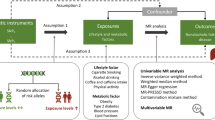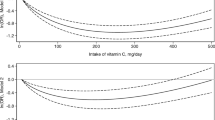Abstract
In view of growing body of evidence substantiating the role of aberrations in one-carbon metabolism in the pathophysiology of breast cancer and lack of studies on gene–gene interactions, we investigated the role of dietary micronutrients and eight functional polymorphisms of one-carbon metabolism in modulating the breast cancer risk in 244 case–control pairs of Indian women and explored possible gene–gene interactions using Multifactor dimensionality reduction analysis (MDR). Dietary micronutrient status was assessed using the validated Food Frequency Questionnaire. Genotyping was done for glutamate carboxypeptidase II (GCPII) C1561T, reduced folate carrier (RFC)1 G80A, cytosolic serine hydroxymethyltransferase (cSHMT) C1420T, thymidylate synthase (TYMS) 5′-UTR tandem repeat, TYMS 3′-UTR ins6/del6, methylenetetrahydrofolate reductase (MTHFR) C677T, methyltetrahydrofolate-homocysteine methyltransferase (MTR) A2756G, methyltetrahydrofolate-homocysteine methyltransferase reductase (MTRR) A66G polymorphisms by using the PCR-RFLP/AFLP methods. Low dietary folate intake (P < 0.001), RFC1 G80A (OR: 1.38, 95% CI 1.06–1.81) and MTHFR C677T (OR: 1.74 (1.11–2.73) were independently associated with the breast cancer risk whereas cSHMT C1420T conferred protection (OR: 0.72, 95% CI 0.55–0.94). MDR analysis demonstrated a significant tri-variate interaction among RFC1 80, MTHFR 677 and TYMS 5′-UTR loci (P trend < 0.02) with high-risk genotype combination showing inflated risk for breast cancer (OR 4.65, 95% CI 1.77–12.24). To conclude, dietary as well as genetic factors were found to influence susceptibility to breast cancer. Further, the current study highlighted the importance of multi-loci analyses over the single-locus analysis towards establishing the epistatic interactions between loci of one-carbon metabolism modulate susceptibility to the breast cancer.


Similar content being viewed by others
References
Murthy NS, Chaudhry K, Nadayil D, Agarwal UK, Saxena S (2009) Changing trends in incidence of breast cancer: Indian scenario. Indian J Cancer 46:73–74
Rebbeck TR, Walker AH, Phelan CM, Godwin AK, Buetow KH, Garber JE, Narod SA, Weber BL (1997) Defining etiologic heterogeneity in breast cancer using genetic biomarkers. Prog Clin Biol Res 396:53–61 Review
Halapi E, Hakonarson H (2002) Advances in the development of genetic markers for the diagnosis of disease and drug response. Expert Rev Mol Diagn 2(5):411–421 Review
Ford D, Easton DF (1995) The genetics of breast and ovarian cancer. Br J Cancer 72:805–812
Melnyk S, Pogribna M, Miller BJ, Basnakian AG, Pogribny IP, James SJ (1999) Uracil misincorporation, DNA strand breaks, and gene amplification are associated with tumorigenic cell transformation in folate deficient/repleted Chinese hamster ovary cells. Cancer Lett 146(1):35–44
Christman JK, Sheikhnejad G, Dizik M, Abileah S, Wainfan E (1993) Reversibility of changes in nucleic acid methylation and gene expression induced in rat liver by severe dietary methyl deficiency. Carcinogenesis 14(4):551–557
Lee SA, Kang D, Nishio H, Lee MJ, Kim DH, Han W, Yoo KY, Ahn SH, Choe KJ, Hirvonen A, Noh DY (2004) Methylenetetrahydrofolate reductase polymorphism, diet, and breast cancer in Korean women. Exp Mol Med 36(2):116–121
Xu X, Gammon MD, Zhang H, Wetmur JG, Rao M, Teitelbaum SL, Britton JA, Neugut AI, Santella RM, Chen J (2007) Polymorphisms of one-carbon-metabolizing genes and risk of breast cancer in a population-based study. Carcinogenesis 28(7):1504–1509
Cheng CW, Yu JC, Huang CS, Shieh JC, Fu YP, Wang HW, Wu PE, Shen CY (2008) Polymorphism of cytosolic serine hydroxymethyltransferase, estrogen and breast cancer risk among Chinese women in Taiwan. Breast Cancer Res Treat 111(1):145–155
Akisik E, Dalay N (2007) Functional polymorphism of thymidylate synthase, but not of the COMT and IL-1B genes, is associated with breast cancer. J Clin Lab Anal 21(2):97–102
Chen J, Gammon MD, Chan W, Palomeque C, Wetmur JG, Kabat GC, Teitelbaum SL, Britton JA, Terry MB, Neugut AI, Santella RM (2005) One-carbon metabolism, MTHFR polymorphisms, and risk of breast cancer. Cancer Res 65(4):1606–1614
Grieu F, Powell B, Beilby J, Iacopetta B (2004) Methylenetetrahydrofolate reductase and thymidylate synthase polymorphisms are not associated with breast cancer risk or phenotype. Anticancer Res 24(5B):3215–3219
Lissowska J, Gaudet MM, Brinton LA, Chanock SJ, Peplonska B, Welch R, Zatonski W, Szeszenia-Dabrowska N, Park S, Sherman M, Garcia-Closas M (2007) Genetic polymorphisms in the one-carbon metabolism pathway and breast cancer risk: a population-based case-control study and meta-analyses. Int J Cancer 120(12):2696–2703
Pepe C, Guidugli L, Sensi E, Aretini P, D’Andrea E, Montagna M, Manoukian S, Ottini L, Radice P, Viel A, Bevilacqua G, Caligo MA (2007) Methyl group metabolism gene polymorphisms as modifier of breast cancer risk in Italian BRCA1/2 carriers. Breast Cancer Res Treat 103(1):29–36
Lin WY, Chou YC, Wu MH, Huang HB, Jeng YL, Wu CC, Yu CP, Yu JC, You SL, Chu TY, Chen CJ, Sun CA (2004) The MTHFR C677T polymorphism, estrogen exposure and breast cancer risk: a nested case-control study in Taiwan. Anticancer Res 24(6):3863–3868
Shrubsole MJ, Gao YT, Cai Q, Shu XO, Dai Q, Jin F, Zheng W (2006) MTR and MTRR polymorphisms, dietary intake, and breast cancer risk. Cancer Epidemiol Biomarkers Prev 15(3):586–588
Justenhoven C, Hamann U, Pierl CB, Rabstein S, Pesch B, Harth V, Baisch C, Vollmert C, Illig T, Brüning T, Ko Y, Brauch H (2005) One-carbon metabolism and breast cancer risk: no association of MTHFR, MTR, and TYMS polymorphisms in the GENICA study from Germany. Cancer Epidemiol Biomarkers Prev 14(12):3015–3018
Matsuo K, Hamajima N, Hirai T, Kato T, Inoue M, Takezaki T, Tajima K (2002) Methionine synthase reductase gene A66G polymorphism is associated with risk of colorectal cancer. Asian Pac J Cancer Prev 3(4):353–359
Gemmati D, Ongaro A, Scapoli GL, Della Porta M, Tognazzo S, Serino ML, Di Bona E, Rodeghiero F, Gilli G, Reverberi R, Caruso A, Pasello M, Pellati A, De Mattei M (2004) Common gene polymorphisms in the metabolic folate and methylation pathway and the risk of acute lymphoblastic leukemia and non-Hodgkin’s lymphoma in adults. Cancer Epidemiol Biomarkers Prev 13(5):787–794
Shi Q, Zhang Z, Li G, Pillow PC, Hernandez LM, Spitz MR, Wei Q (2005) Polymorphisms of methionine synthase and methionine synthase reductase and risk of lung cancer: a case-control analysis. Pharmacogenet Genomics 15(8):547–555
Zhang Z, Shi Q, Liu Z, Sturgis EM, Spitz MR, Wei Q (2005) Polymorphisms of methionine synthase and methionine synthase reductase and risk of squamous cell carcinoma of the head and neck: a case-control analysis. Cancer Epidemiol Biomarkers Prev 14(5):1188–1193
Carr DF, Whiteley G, Alfirevic A, Pirmohamed M, FolATED study team (2009) Investigation of inter-individual variability of the one-carbon folate pathway: a bioinformatic and genetic review. Pharmacogenomics J 9(5):291–305 Review
Kumar K, Kaiser J (2006) Methylene tetrahydrofolate reductase (MTHFR) C677T and A1298C polymorphisms and breast cancer in South Indian population. Int J Cancer Res 2(2):143–151
Gopalan C, Rama Sastri BV, Balasubramanian SC (2007) Nutritive value of Indian foods. National Institute of Nutrition, Indian Council of Medical Research, India
Krebs J (2002) McCance and Widdowson’s the composition of foods: summary edition, 6th summary ed. The Royal Society of Chemistry/Food Standards Agency, Cambridge/London
U.S. Department of Agriculture, Agricultural Research Service (2006) USDA National Nutrient Database for Standard Reference, Release 18. Nutrient Data Laboratory Home Page. http://www.ars.usda.gov/ba/bhnrc/ndl
Salazar LA, Hirata MH, Cavalli SA, Machado MO, Hirata RD (1998) Optimized procedure for DNA isolation from fresh and cryopreserved clotted human blood useful in clinical molecular testing. Clin Chem 44:1748–1750
Pike MC, Spicer DV, Dahmoush L, Press MF (1993) Estrogens, progestogens, normal breast cell proliferation, and breast cancer risk. Epidemiol Rev 15(1):17–35
Ursin G, London S, Stanczyk FZ, Gentzschein E, Paganini-Hill A, Ross RK, Pike MC (1999) Urinary 2-hydroxyestrone/16alpha-hydroxyestrone ratio and risk of breast cancer in postmenopausal women. J Natl Cancer Inst 91(12):1067–1072
Jansen G, Mauritz R, Drori S, Sprecher H, Kathmann I, Bunni M, Priest DG, Noordhuis P, Schornagel JH, Pinedo HM, Peters GJ, Assaraf YG (1998) A structurally altered human reduced folate carrier with increased folic acid transport mediates a novel mechanism of antifolate resistance. J Biol Chem 273(46):30189–30198
Chango A, Emery-Fillon N, de Courcy GP, Lambert D, Pfister M, Rosenblatt DS, Nicolas JP (2000) A polymorphism (80 G → A) in the reduced folate carrier gene and its associations with folate status and hyperhomocysteinemia. Mol Genet Metab 70:310–315
Ifergan I, Jansen G, Assaraf YG (2008) The reduced folate carrier (RFC) is cytotoxic to cells under conditions of severe folate deprivation. RFC as a double edged sword in folate homeostasis. J Biol Chem 283(30):20687–20695
Yamada K, Chen Z, Rozen R, Matthews RG (2001) Effects of common polymorphisms on the properties of recombinant human methylenetetrahydrofolate reductase. Proc Natl Acad Sci USA 98(26):14853–14858
Sharp L, Little J, Schofield AC, Pavlidou E, Cotton SC, Miedzybrodzka Z, Baird JO, Haites NE, Heys SD, Grubb DA (2002) Folate and breast cancer: the role of polymorphisms in methylenetetrahydrofolate reductase (MTHFR). Cancer Lett 181(1):65–71
Shrubsole MJ, Gao YT, Cai Q, Shu XO, Dai Q, Hébert JR, Jin F, Zheng W (2004) MTHFR polymorphisms, dietary folate intake, and breast cancer risk: results from the Shanghai Breast Cancer Study. Cancer Epidemiol Biomarkers Prev 13(2):190–196
Beilby J, Ingram D, Hähnel R, Rossi E (2004) Reduced breast cancer risk with increasing serum folate in a case-control study of the C677T genotype of the methylenetetrahydrofolate reductase gene. Eur J Cancer 40(8):1250–1254
Campbell IG, Baxter SW, Eccles DM, Choong DY (2002) Methylenetetrahydrofolate reductase polymorphism and susceptibility to breast cancer. Breast Cancer Res 4(6):R14
Horie N, Aiba H, Oguro K, Hojo H, Takeishi K (1995) Functional analysis and DNA polymorphism of the tandemly repeated sequences in the 5′-terminal regulatory region of the human gene for thymidylate synthase. Cell Structr Funct 20(3):191–197
Heil SG, Van der Put NM, Wass ET, den Heijer M, Trijbels FJ, Blom HJ (2001) Is mutated serine hydroxymethyltransferase (SHMT) involved in the etiology of neural tube defects? Mol Genet Metab 73(2):164–172
Fu TF, Hunt S, Schirch V, Safo MK, Chen BH (2005) Properties of human and rabbit cytosolic serine hydroxymethyltransferase are changed by single nucleotide polymorphic mutations. Arch Biochem Biophys 442(1):92–101
Reed MC, Nijhout HF, Neuhouser ML, Gregory JF III, Shane B, James SJ, Boynton A, Ulrich CM (2006) A mathematical model gives insights into nutritional and genetic aspects of folate-mediated one-carbon metabolism. J Nutr 136(10):2653–2661
Dizik M, Christman JK, Wainfan E (1991) Alterations in expression and methylation of specific genes in livers of rats fed a cancer promoting methyl-deficient diet. Carcinogenesis 12(7):1307–1312
Butterworth M, Lau SS, Monks TJ (1996) 17 beta-Estradiol metabolism by hamster hepatic microsomes. Implications for the catechol-O-methyl transferase-mediated detoxication of catechol estrogens. Drug Metab Dispos 24(5):588–594
Acknowledgments
This work was supported by the grant funded by Indian Council of Medical Research (ICMR), New Delhi (Ref No. 5/13/32/2007). We thank Miss Y. Rupasree, Mrs. S.V. Vijaya Lakshmi, Miss P. Shree Divyya and Mr. E. Chandra Sekhar for providing technical support.
Author information
Authors and Affiliations
Corresponding author
Rights and permissions
About this article
Cite this article
Naushad, S.M., Pavani, A., Digumarti, R.R. et al. Epistatic interactions between loci of one-carbon metabolism modulate susceptibility to breast cancer. Mol Biol Rep 38, 4893–4901 (2011). https://doi.org/10.1007/s11033-010-0631-z
Received:
Accepted:
Published:
Issue Date:
DOI: https://doi.org/10.1007/s11033-010-0631-z




